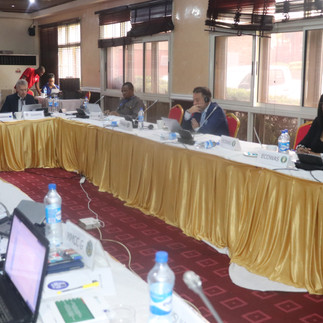The ECOWAS Commission conducts a workshop to ease the adoption of its Maritime Manual of Procedure
- Nov 20, 2023
- 3 min read

On November 20, 2023, in Abuja, the Economic Community of West African States (ECOWAS) Commission is organizing an important workshop with the support of the SWAIMS project. The workshop is focused on the adoption and implementation of the Manual of Procedures (MoPs) and Standard Operating Procedures (SoPs) for ECOWAS Maritime Centres. This significant event will be held over two days, concluding on November 21, 2023.
The workshop brings together a diverse group of participants, including Heads of ECOWAS CRESMAO Maritime Centres, MMCC Zones E, F and G, Heads of Operations and Administrative and Finance of CRESMAO and the MMCCs, as well as representatives from the ECOWAS Regional Security Division.
The workshop aims to adopt the final version of the MoPs for final implementation in the ECOWAS Maritime Centres.
During the opening ceremony, Dr Axel Klein, Team Leader of the SWAIMS project, expressed, "The SWAIMS project funded by the European Union is designed to support ECOWAS Maritime Security, and the adoption of the MoPs serves as a critical milestone in enhancing the operational efficiency and effectiveness of ECOWAS Maritime Centres. It underscores our commitment to promoting maritime security and safety in the ECOWAS region."
Commodore Richard Maru Shammah, Director of CRESMAO, recalled that the reviewed version of the Manual of Procedures (MoPs) and Standing Operating Procedures (SOPs) for which, ready for adoption, will provide the much-needed guidance to ECOWAS Maritime Centres to better function in unison when conducting administrative and operational activities.
Dr. Dieng Abdourahmane, Head of the Regional Security Division at the ECOWAS Commission, commended the SWAIMS project, for its Support and the Head of Maritimes Centre for the development of the Manual of Procedures. He stated that "The ECOWAS Commission remains resolute in its dedication to developing and implementing best practices for the ECOWAS Maritime Centres."
These two days of seminar will lead to the adoption of the manual, which will be submitted to ECOWAS management.
For further information, please contact:
[RAO Support Cell ] +234806921929] ECOWAS Commission kskouadio@ecowas.int
About SWAIMS Project:
The Gulf of Guinea, Nigeria, and Niger Delta suffer from major and regular maritime insecurity that range from piracy, armed robbery, and kidnapping to illegal oil bunkering, trafficking, and smuggling.
The Support to West Africa Integrated Maritime Security (SWAIMS) programme is a multi-country intervention, covering member states of the Economic Community of West African States (ECOWAS) under the European Union-West Africa regional Indicative Programme—Benin, Burkina Faso, Cabo Verde, Côte d’Ivoire, The Gambia, Ghana, Guinea, Guinea Bissau, Liberia, Mali, Niger, Nigeria, Senegal, Sierra Leone, Togo, as well as Mauritania with a specific focus on coastal countries.
Sample Activities
Strengthen integrated maritime governance, policies, laws and systems to support maritime security.
Assess the impact of illicit financial circuits generated by maritime crime.
Strengthen regional operational training.
Improve coordination with the private sector and participation of civil society in fighting maritime insecurity.
Sample Results
Supported the preparation of the background material for the grant to ECOWAS Inter-Governmental Action Group against Money Laundering in West Africa (GIABA), and the preparation of the background material for the grants to Académie Régionale des Sciences et Techniques de la Mer (ARSTM), Interregional Maritime Security Institute (ISMI), and to the Regional Maritime University (RMU).
Formulated a civil society organisation (CSO) engagement strategy to provide a framework for the programme activities that involve civil society.
To tackle the impact of COVID-19 organized via videoconferences national webinars on raising awareness of CSOs in Côte d’Ivoire, Benin, Guinea Bissau, and Togo to promote wider engagement of the civil society in maritime security.
Launched the international tender procedure for supply of equipment to ECOWAS Maritime Centers and ECOWAS Multinational Maritime Coordination Center.
Formulated a private sector strategy, supported the development of an Alert Bulletin, and organized a webinar to launch the strategy and foster the engagement of the private sector in maritime.
Established a functional project management unit to coordinate the implementation of the different components of the project and to ensure monitoring and timely reporting on project activities and results by the implementing partners (UNODC, CILCL, ARSTM, ISMI, RMU, GIABA).
Acted as the Secretariat to the first Steering Committee, coordinated visibility actions, and liaised with other EU-funded projects in the Gulf of Guinea to ensure coherence of action.
Conducted a detailed survey of maritime security stakeholders, delineating roles, and responsibilities in each member state.
Assessed the legal framework and existing legislation governing maritime crime.
Contributed to the drafting of model manuals and work packages for developing integrated maritime policy and the planned maritime security workshops.
Submitted a draft juridical report itemizing the legislation relating to maritime crime in ECOWAS member states.






















Comments